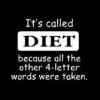Search the Community
Showing results for 'alcohol'.
Found 17,501 results
-
The details of why you are seeking counseling can not disclosed to the employer. Many people see mental health professionals. Now if you are worried about a "good job", they may will ask you about any substance or alcohol dependency or abuse. If you lie on that, that could cause you a good job, as possibly coming to work while under the influence of alcohol. What is more important is that you receive help. If you do not want to see a mental health care professional, please start with a support group like AA. You are too young to ruin your life and health. Wishing you the best.
-


Advice from ex smokers?
bigmamaAfrica replied to cassandramarie93's topic in PRE-Operation Weight Loss Surgery Q&A
I have quit twice in the past 2 yrs.. Both times cold turkey. Between pregnancy and nursing I was not smoking for most of 2014/15.. My second quit phase was right before the Sleeve surgery in March. Had my last ciggie week before my op. My wife smokes (heavily) and so the first few days is always rough on both of us..I'm sensitive to the smell and her always going for a cigarette just irks me! Lol. But, it gets better. I just redirect my attention - thank goodness for toddlers! Going out can be hard (alcohol n cigarettes are a match made in heaven).. But luckily, my alcohol consumption in general has drastically reduced... Again.. Could be the toddlers! So my advice is have very exhausting young children in the house at all times! Lol On a serious note though - don't be nervous, you will be ok. It so commendable that you're even starting early. You're planning for success. Even without WLS, quitting is always the best choice for your health. Good luck Sent from my iPad using the BariatricPal App -


What I wish I had known...
Neeser replied to justhere4theshow's topic in Tell Your Weight Loss Surgery Story
Everyone is different. Believe me I miss food so much. I play tricks on myself. Sunday dinners I keep myself busy and sit down and eat when people are almost done. Alcohol is not a problem. I don't drink as much as I did but I still go out and have a good time. The smoking I quit but sometimes I have just a puff or two. It is all in your mind. I still sometimes think what the hell did I do to myself when I am craving a hamburger or deli sandwich and know if I eat the bread I will throw up. It bugs you in the beginning but when you go from a size 20 to 12 and feel 20 years younger than it is worth it. -


Please Read: Keep BariatricPal a Safe Place
OKCPirate replied to Alex Brecher's topic in General Weight Loss Surgery Discussions
@@Alex Brecher - good post, the only thing I would add is when I am posting to someone's question, I try to differentiate between "facts" and "opinions." For instance there are some accepted best practices on alcohol. I feel obligated to say this is what we know, but IMHO, this is what I have experienced. I think when people make clear when they are sharing but not claiming absolute certainty, it makes it easier for everyone to keep their reactions in perspective. IMHO -
I don't believe half of the people responding lack comprehension to what you wrote. There is a liquid diet (typically 1-2 weeks prior to the surgery) but surgeons also recommend losing weight from the initial consultation until the surgery date too to shrink the liver, lose fat which gives more room for them to work, show that you are committed to losing weight, lowers your chance of a complication (due to hopefully improved health/fitness, lower weight, smaller liver and more room to perform the surgery, etc.), amongst other reasons. Also, most medical plans require a 3-6 month doctor supervised diet prior to the surgery. You would be in that phase, even though you were not in your liquid phase. I know my surgeon recommended not drinking any alcohol during this period due to wasted calories, bad habits, etc.. Why did you ask this question to people on the internet, most of whom don't have any medical experience, also, criticize them when they answer your question to the best that they thought they understood what was being asked?
-
I should have never posted this since 50% of everyone who responded lacks the comprehension to understand my question. I did not ask about consuming alcohol ON the liquid/pre-op diet. This was directed strictly to PRIOR to starting the diet. Reading all of the posts of food funerals and last hoorahs I'm sure no one on here is perfect, otherwise why are you even in this situation to begin with? I have stuck to my 1600 cal diet religiously over the past few months and my doctor said as long as I stayed within my daily caloric limit she had no problem with me drinking responsibly PRIOR to starting her official pre-op diet. Sent from my iPhone using the BariatricPal App
-
It's more common than you think. So many people hooked on alcohol and drugs are in that boat because of terrible pain! Have you taken care of your dental issue? It's a priority to take care of the pain you are medicating with alcohol. Go to the source and fix the actual problem instead of placating the symptoms. Not sure what your best path is with the alcohol withdrawal but a detox/rehab clinic may be the perfect answer. Best of luck to you. You've been through a lot. Sent from my iPhone using the BariatricPal App
-
Wow. I never knew alcohol did this. I'm quitting completely. Had no idea it enlarged your liver for a 2 weeks. Though I don't drink that much, I'm sure to have at the very least one or two drinks a week, so that means I've never ever had a normal liver since I was 19??? Yikes! Sent from my iPhone using the BariatricPal App
-
Just wondering if many people experience that alcohol affects them less after surgery? We have all been warned it will affect us more but clearly in this case that is untrue.... Sent from my iPhone using the BariatricPal App
-
This reply is after the fact, I would have asked your surgeon. The preop diet, in part, helps shrink the liver. I don't see how alcohol consumption prior to surgery could have no effect on the liver (maybe very small amounts of alcohol wouldn't, but why risk it without asking your surgeon's team?)
-


Please Read: Keep BariatricPal a Safe Place
jintycb replied to Alex Brecher's topic in General Weight Loss Surgery Discussions
Just a quick comment. Anyone who suffers from an addiction and goes through a twelve step program with AA, NA, OA etc is given tough love. They are also given experience, strength and hope from other 'vet' recovering addicts. They are told to 'stick with the winners'. As a recovering alkie, smoker and glutton (hence being the recipient of WLS) I can only speak from my experience personally from AA and my alcoholism. The tough love and vets from the Fellowship of AA served me well. I would probably be dead by now if I hadn't taken the cotton wool out of my ears and listened, and shoved it in my gob so that I couldn't spout excuses and crap!!! I got very ruffled feathers when I was a newby as I thought that I knew better on many occasions. I was given some tough 'suggestions' as to what I should be doing to get sober. I equate this site as the WLS version of AA. I love the fact that there is so much humour (we laugh at ourselves, not at our disease of overeating) and I also stick with the winners here. You know who you are. For heaven's sake, stick around and carry on giving me the support that I have had (in shed loads) over the months since my surgery. If anyone offends me I just form an opinion and share it through private messages. That's when you discover like minded folks. I'm sure that there are people who are upset by what I post but they have the facility to have a private moan to their like minded chums. So, the long and the short of this rambling post is that if you don't like my forthright comments, go away and have a moan or just ignore me. I'm not going anywhere by the way and I remain, a miserable, b!tchy old git. -


Advice from ex smokers?
cdsjjotn replied to cassandramarie93's topic in PRE-Operation Weight Loss Surgery Q&A
Quit several times during the year before my surgery, as my date got closer I just said that's it no more. It's been 9 months now. I could probably pick a cigarette up and smoke it with no problem but I really don't ever want to go back there. I did have to quit coffee and alcohol too at the same time. I started working out a lot too. Smoking and exercise don't really go together.. Good luck, you got this, it's so worth it!! Sent from my iPhone using the BariatricPal App -


What I wish I had known...
Cape Crooner replied to justhere4theshow's topic in Tell Your Weight Loss Surgery Story
I don't doubt anything you've said, but I have to say my experience couldn't have been any more different. I felt like I was on a fairly strict diet for 6 weeks before surgery, but it was easy because I stopped drinking alcohol. After surgery, I had no pain, no side effects, and no hunger. I followed the 30 day post opt diet to a T and by 6 weeks out, I eased back to a normal life, just ate less. Oh yeah, never had a second thought, mood swing, or anything but joy over the new me! The only thing I wish I'd known was how easy it would all be. I would have done it 20 years ago! -


Well..... decision made!
KristenLe replied to olliesoda's topic in PRE-Operation Weight Loss Surgery Q&A
Our Program was very thorough and made it clear that we are at risk of replacing one addiction for another. That many find they have issues with alcohol, gambling, shopping addiction now that they can no longer "feed" their feelings. If anyone has any plans of WLS - I would certainly hope they research enough to know the possible concerns post op. I recommend this book which deals with the emotional aspects of living after WLS. https://www.amazon.com/Emotional-First-Aid-Kit-Practical-ebook/dp/B0054RXXS0?ie=UTF8&btkr=1&redirect=true&ref_=dp-kindle-redirect -


Well..... decision made!
GinaCampbell replied to olliesoda's topic in PRE-Operation Weight Loss Surgery Q&A
We were only told that carbonation is not our friend and that we can become drunker quicker. Obviously also, alcohol has calories in it that we don't need. And once you have a drink, food choices may not be as good as they should be. In future (if I am ever well enough lol), I wouldn't be afraid to have watered down drinks. But so many alcohols can cause stomach acid issues. Red wine is really low in calories, A flattened slimline (diet) tonic with a bit of vodka in it is low in calories. But my bet though, is that alcohol is the last thing on your mind in the first three months. Sent from my iPhone using the BariatricPal App -


How to quit sugar ?!?!?!?
CelesteWh replied to Armygalbonnie's topic in PRE-Operation Weight Loss Surgery Q&A
I've been lurking on this site for a month or so now, thinking of surgery in January after my insurance changes.....like a lot of posters on this topic, my biggest challenge is with powerful cravings that I can't seem to fight. I don't have out of control hunger, I'm not an emotional eater, and aim not a binge eater. I track my food, and can see patterns of these cravings ruining days/week long string of healthy eating. I'm worried surgery might be futile if the cravings are still with me.....or if they return 2+ years into maintenance. As a last ditch effort while I wait for January, I started taking naltrexone (which is used in the diet drug Contrave- I can't take Contrave because of the Wellbutrin in it, so my dose of Naltrexone is usual dose they use for alcoholism).......and it has been amazing. I don't crave sugar/fat *at all* and also kicked a diet soda habit. I lost 10lbs this month with the same diet minus the crap I used to eat to satisfy the cravings. I've never been a drinker but I do find it interesting to read that there is a link between WLS and alcohol abuse. It's only been a month, so I can't speak to long term results....but so far I am enjoying being free from those cravings. -


Well..... decision made!
transformation replied to olliesoda's topic in PRE-Operation Weight Loss Surgery Q&A
I just spoke with a doctor who works in an addiction clinic. He said stay away from alcohol as bariatric surgery patients become highly susceptible to becoming alcoholic. Don't know any statistics on this... Just may be one person's opinion. I've never been much of a drinker and certainly don't plan to start. -


Well..... decision made!
cdsjjotn replied to olliesoda's topic in PRE-Operation Weight Loss Surgery Q&A
I don't feel my personality changed but definitely my outlook on life has changed. I used to be a eat drink and be merry type of person. Always had a glass of wine (or 2) with dinner and weekend cocktails and basically ate whatever I wanted. I'm 8 months post op now and don't eat whatever because I have to make sure I get my Protein in. As for the alcohol, on a rare occasion I will have 1 glass of wine that I will sip on for the evening if I'm at a special occasion party. I once was forgetful and drank 3 glasses within a shorter period of time and the hangover was so unpleasant I will never do it again, it's not worth it. I was very nervous before surgery about my life changing, and reassured my friends it was just for a few months while healing then I'll be able to go out again and enjoy a few cocktails. Truth is, I don't want to go back to that life, I am so much happier in my healthier lifestyle now. I have lost 84 pounds and have so much energy now that I'm enjoying life in so many different healthier ways. Sent from my iPhone using the BariatricPal App -


Please Read: Keep BariatricPal a Safe Place
4MRB4PHOTO replied to Alex Brecher's topic in General Weight Loss Surgery Discussions
Written communication can be easily misinterpreted since there are no vocal inflections or facial expressions. Other times a person's response is as subtle as a sledgehammer so there is no misinterpretation. Some people are practicing in behaviors which could be counter productive to a successful weight loss, weight maintenance or could have an impact on their health. Coddling is not always the best answer but having compassion is important. We all have read about behaviors here (ex. eating foods that are absolutely wrong for that early of a post WLS stage or drinking larger quantities of alcohol extremely early on) that could have dangerous consequences to their health. In those cases sometimes "tough love" gets the point home. If they knowingly are going against what their surgeon or every respectable published article says not to do, perhaps "tough love" is not the answer and some of "Darwin's theory" should be allowed to prevail. A few of those people complain the loudest to replies that don't condone their behaviors. For the ones that are misinformed or were not provided detailed plans (although they can search on the internet for reputable sources of information by healthcare professionals or ask their surgeon's nurses) they are usually more accepting of the feedback. In some cases the person replying is just an a$$hole and all they want to do is be cruel. I guess the block feature can come in handy when dealing with them. -
Firstly I am delighted that I have found this forum it has really helped reading about the diverse views and experiences. Thank you all for being so honest. Here is my story so far... Moment of truth. Decision made..... I live in UK and have a job I love, but it can be a huge pressure. My work takes me away from home quite often, in the UK to the US and the Far East. Over the years that has taken its toll eating the wrong food, at the wrong times. (And maybe a tipple or two) For a big guy I am quite fit but over the last years have found more aches and pains, to the point I felt the need to visit my doctor, something I don't normally do. I did this 10 days ago. Long story short he gave it me straight .....lose weight or die young....I'm 43 and heading towards an illness crisis .....and his opinion, diabetes, high blood pressure, joint problems and that early grave. I've tried lots of things I've had my ups and downs but now the time has come for something more drastic. The wake-up call I needed had arrived! I don't want to wait to go through the process and however fantastic our national health services is (and it is fab), it will take and age. I don't want to be diabetic or have a heart attack. So...... By 10 AM the following morning I was sat in a consultants office having the various options explained to me. My choice, the sleeve. Within a further 24 hours I'd booked my date with destiny September 13th (and it's not a Friday for the superstitious amongst us!) I have gone from being petrified to super excited I see a future me, doing things that I've not enjoyed for number of years... fastening a seatbelt on an aeroplane....going on the trampoline in our garden writhing rolling off! walking into a normal shop and buying clothes from a normal section. Don't get me wrong I don't want to be mega thin, I like being me but I want to be a me that has longer to live and can enjoy my family, my children, my future grandchildren and actually my work too. Mentally I've got this.....! My concerns....... Personality: I don't want to change my personality has anybody out there experienced that over the long term they change? Food: i've got my head round that it is going to be a nightmare for the first 3/4 months but after this.... Is it truly normal food but obviously in smaller portions and healthier options? Alcohol: now then..... my biggest enjoyment and my nemesis ....my consultant asked me? do you drink a lot? I said no ....however when I go out I'm always known as the life and soul of the party and the last man standing.... response you can still be a life and soul of the party but expect to be the first one falling. What have people experienced with alcohol? How much on a night out? What type? Rightly or wrongly , I've created a bucket list of things I wish to eat or drink before the pre-op diet....my son made me laugh yesterday when he said 'Dad make sure you don't die while trying to complete your bucket list'... Point well noted! If you have got to this point thanks for reading I'll be keeping in contact via the forms. I'm sure as I need the help on the journey.. You, the Warriors that have gone before me will offer the support and help needed! Ollie x
-


Spouse unable to deal with changes
hbrhonda replied to hbrhonda's topic in General Weight Loss Surgery Discussions
UPDATE: We stopped in Vegas on our way to Utah to go riding. Didn't drink alcohol because we still had driving to do. We had an amazing time. He laughs at my portion size. We did eat out just about everyday. We chose his meal together from the healthier options, then he allowed me to take my share. Commenting along the way that he won't ever miss 2 oz of his meal. I think the biggest part of my dilemma was I thought he wanted to lose weight with me and I was supper frustrated that he wasn't willing to change. I am coping much better with the advice that I chose this surgery, My life will forever be changed. He didn't have this surgery so he doesn't have to tool. I was getting all stressed out trying to help him eat healthy, reminding him to not drink. SCREW that!! He is a big boy, if he wants things to stay that way, why should it stress me out. I now say "I am heading to the gym" and off I go. If he tags along fine, if he watches TV fine. Eventually he may get on board but for now it looks like life as usual at least for him. I am down 30 lbs!!!! -


Please Read: Keep BariatricPal a Safe Place
theantichick replied to Alex Brecher's topic in General Weight Loss Surgery Discussions
I don't know what prompted this message. I don't (can't) read all of the messages on this board, because there's just too many. But in what I have read, I haven't seen much that rises to the level of ugliness and disrespect held out here, especially from the "vets". I've seen a few personal clashes between vets spill over, but I would think things like that could be handled in private messages. I fear that this message has and will continue to cost us some of our most experienced members on this board, ones who have been invaluable to me in my decision and preparing for my surgery. This saddens me, not only because I will miss their posts, but because I believe that the new people in the community will lose out. My therapist asked me why I get so worked up about My Big Fat Fabulous Life, and the Healthy at Every Size movement's message that extreme obesity can be healthy. The answer is that I get worked up because it's putting wrong information out there, and it can harm people. I was an ER nurse, and provided patient education to a wide cross section of our population, and in my experience only a very small percentage of people are educated and well-read enough to be able to tell what information they are exposed to in media, specifically the internet and social media, is incorrect. Heck, I saw a meme the other day that jokingly advised people to put sugar in their auto gas tanks to keep the gas from freezing. And a few days later, news reports about people actually doing so. So when people on TLC are advocating extreme obesity as a "healthy choice" I get upset because people will believe it. Likewise, I worry when I see topics broached on this board and advice that can be very harmful to newbies who don't have the experience or knowledge to judge the validity of the advice. Advice like there is absolutely no health concerns with e-cigarettes, or that drinking alcohol shortly after post-op is fine, or that eating solid food while still in the liquids restriction immediately post-op is just fine. I don't have the experience that some others do here, being pre-op, but I am a registered nurse, and I know that some of this information is dangerous. Yet when vets here or medically trained people like myself say - IN VERY MODERATE WAYS - that these are not really great ideas, we get trounced upon, and called bullies. Yet if we don't speak up, there will be people who will believe what they are reading that is just patently wrong. All I know is that some very straight talk from people who had been through it is what I needed, and what I found here. And some of those very same people are exiting stage left because they're tired of being called out for being "mean" and censured for that same straight talk. Bariatric surgery is a huge and permanent step, and if all we're doing is validating every opinion no matter how dangerous or ill-informed, then I fear for the same newbies that this message is trying to "protect". Instead of assuming people are coming to this board as rational adults capable of processing critical feedback, it seems that we're to assume they are all fragile souls who we can't say anything negative to. I don't find that a flattering or helpful assumption. Just my spare change, take it or leave it. No offense intended, just my opinion, and all that jazz. -


Breaking my silence; my demons and my future.
Seagull replied to cassandramarie93's topic in PRE-Operation Weight Loss Surgery Q&A
Methamphetamine is great for weight loss. I'm not sure if you admit that you recently used that you will be approved through insurance. I remember having to sign that I was substance free, including alcohol, for a specific period of time but I don't remember how long. The psychologist also asked me 30 different ways about past alcohol/drug use. I happened to never try anything other than alcohol so I was safe. My only addiction was to greasy food. Sent from my iPhone using the BariatricPal App -


Need advice from gastric bypass veterans
emme.vee replied to beachwalker4rny's topic in Gastric Bypass Surgery Forums
If you don't want to feel like an oddball, I always make it very clear that I don't drink and drive. At my work we have beer Friday's or sometimes we have little parties in the last hour of work for special occasions. While I would love to enjoy an alcoholic beverage (I'm pre-op) I always decline because I feel very strongly on drinking and driving. I had a family member die bc he had been drinking and fell out of a moving vehicle. I just use the drinking and driving excuse. Now if that doesn't work, someone once told me what they do is get a drink and carry it around all night. Everyone is drinking and doesn't even notice! Lol. If you actually think you can handle an alcoholic beverage, here is a great drink I was introduced to as a low cal drink: Malibu Rum with Water over ice. It tastes really good! I was surprised. And there is only 50 calories per ounce, so provided you drink the whole thing, that's 75 calories. Good luck. I love social drinking and I know I will miss it when ever I do get my sleeve, but it is a small thing I am willing to give up for a bigger better change in my life. Have fun!! Sent from my iPhone using the BariatricPal App -


Need advice from gastric bypass veterans
Daisee68 replied to beachwalker4rny's topic in Gastric Bypass Surgery Forums
I am about 14 months post-op and still struggle with this a little. At 7 months post-op, my boss came in town and invited us out for drinks. I ordered Water. Got an odd look but he didn't say anything. I was frustrated that night because I "couldn't have fun". Sigh.... Now I can (and do on a very rare occasion) have alcohol but I am at goal and trying to figure out maintenance, so I am trying to consider it carefully and ALWAYS count the calories. One thing I find difficult is that once I lose my inhibitions a little, then I feel like "WTH?! I can eat!" and that is dangerous, so I think that reason alone steers me clear of alcohol for the most part. Now having said that, I just started a new job this week and got invited out for happy hour and I sadly declined. I want to go because I want to get to know my new co-workers better but I knew I wasn't strong enough that day to not go and drink too much. (Then I ended up binging on chocolate when I got home. Stupid stupid choice.) I hope that next time I can go and be responsible. I clearly have addiction issues - both with food and alcohol. So all of that didn't really answer your question. Early on, I had a spicy virgin bloody mary and I really enjoyed that. It does have calories but I figured I was at least getting some nutrients from the vegetable juice (I could be lying to myself though). When I went on vacation, I drank Crystal Light flavored water mixed with vodka. The raspberry lemonade and the peach tea were both really good that way, so if you can order a vodka water (not soda) and then add a pack of Crystal Light, that might work for you. I have also done well sipping VERY slowly on a glass of wine (but it is the 2nd glass that I have to avoid and am not good at doing.) Don't feel guilty if you want to have an alcoholic drink - as long as it is ok with your doctor and as long as you can do it only occasionally. (Transfer addiction is a very REAL issue in the WLS world.)Otherwise, honestly, the best thing to do is stick with just plain water with a lime or lemon.




